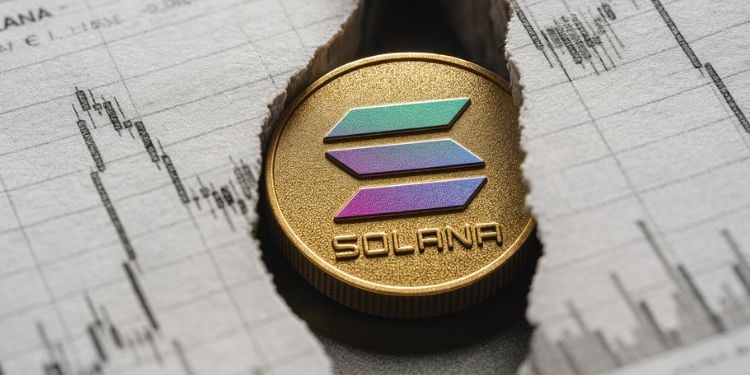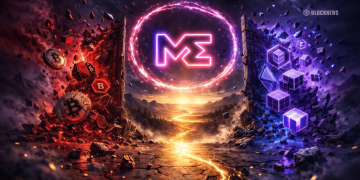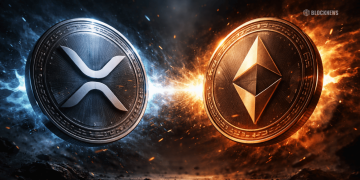- Solana briefly surpassed 100,000 TPS in stress testing, though real-world usage remains closer to 1,050 TPS once validator votes are excluded.
- The proposed Alpenglow upgrade could cut block finality from 12.8 seconds to as low as 100–150 ms, using off-chain voting with cryptographic proofs.
- Debate continues over the 1.6 SOL Validator Admission Ticket fee, with concerns it may price out smaller validators despite lowering overall costs.
Solana just pulled off a staggering feat — briefly smashing through the 100,000 transactions per second mark during a weekend stress test. The test used “noop” program calls (essentially lightweight transactions that don’t actually do anything meaningful), but still, the raw throughput number is a first for any major blockchain on mainnet. For a network already known for speed, it’s another line in the sand.
Mert Mumtaz, CEO of Helius, shared the results showing one block with over 43,000 successful transactions and around 50 fails, totaling 107,540 TPS at peak. That’s an eye-popping figure, but let’s be real — this isn’t the same as real-world payments, swaps, or DeFi contracts firing all at once. Think of it like a race car on an empty track: the top speed is flashy, but normal roads look very different.
Real-World Usage Still Far Below
Despite the test hype, Solana’s real-world throughput paints a more modest picture. Daily averages hover near 3,700 TPS according to Solscan. But here’s the catch: roughly two-thirds of that number is just validator votes used to maintain consensus. Strip those out, and actual user-driven transactions sit closer to 1,050 TPS, with Chainspect reporting similar figures at about 1,004 TPS.
It’s not bad — still leagues ahead of most chains — but far from the six-digit headline numbers. For now, much of Solana’s activity is dominated by memecoin frenzy, especially Pump.fun, which controls over 60% of TVL. The network is fast, yes, but it’s also being flooded with playful speculation, raising the question of how much of that capacity is being used for meaningful economic activity.
Alpenglow: A Potential Game-Changer
What really has people talking isn’t just the stress test, but the Alpenglow upgrade that validators are currently voting on (SIMD-0326). If passed, it would rip out the existing TowerBFT consensus and replace it with a completely new system that relies on off-chain voting.
The promise? Cutting block finality down from 12.8 seconds to somewhere between 100 and 150 milliseconds. That would push Solana into Web2 territory, where speed feels almost instantaneous. Imagine crypto transactions clearing faster than swiping a credit card.
Here’s how it works: instead of flooding the network with validator votes every slot, Alpenglow has validators trade votes directly and cryptographically prove results. Using the new Votor protocol, blocks could be finalized in just one round with 80% validator approval, or two rounds with 60%. No more gossip-heavy traffic clogging bandwidth. It’s leaner, cheaper, faster.
Validator Admission Fee Sparks Debate
Of course, nothing in crypto is ever simple. The proposal includes a 1.6 SOL Validator Admission Ticket fee per epoch, which would be burned to help offset inflation. Supporters argue it actually lowers costs by about 20% compared to current voting transaction expenses. Critics, though, worry this flat fee could edge out smaller validators who already struggle with expenses.
Some in the community have floated tiered models, where bigger stakers pay more (maybe 5 SOL) and smaller ones less (maybe 0.5 SOL). The debate has split the ecosystem, with some cheering the efficiency gains while others caution that rushing such a huge shift without more testing could introduce new risks. Questions remain around how off-chain voting would interact with Jito auction procedures, or how transaction expirations get handled without proof-of-history acting as the clock.
A Defining Vote for Solana
The Alpenglow vote is running across epochs 833 to 842, requiring a two-thirds majority of “yes” votes to pass, with at least a 33% quorum including abstentions. If approved, this would be one of the boldest consensus overhauls attempted by a major chain.
For Solana, this moment feels like a crossroads. The stress test shows raw horsepower is there. But whether the network can evolve into a system with near-instant finality — without sacrificing decentralization or resilience — is the question hanging in the air. If Alpenglow lands smoothly, Solana could push blockchain performance into a zone even skeptics can’t ignore. If not, well, it risks breaking the machine while trying to make it faster.














